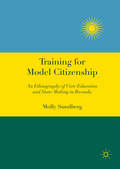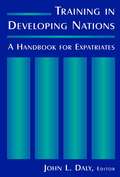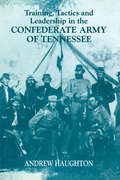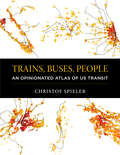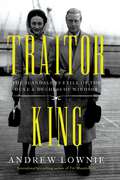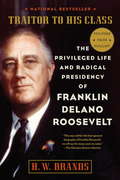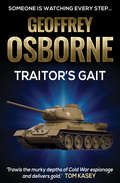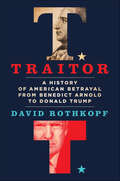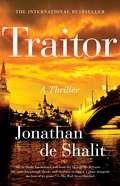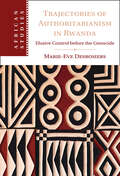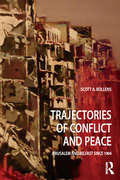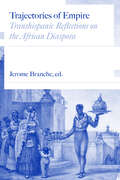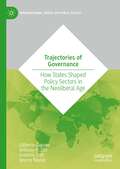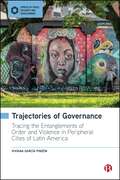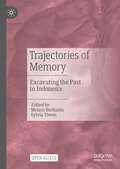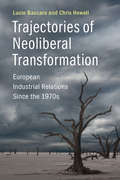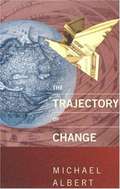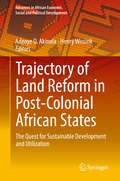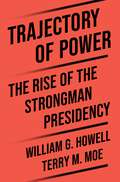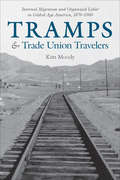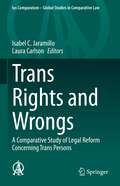- Table View
- List View
Training for Catastrophe: Fictions of National Security after 9/11
by Lindsay ThomasA timely, politically savvy examination of how impossible disasters shape the very real possibilities of our worldWhy would the normally buttoned-down national security state imagine lurid future scenarios like a zombie apocalypse? In Training for Catastrophe, author Lindsay Thomas shows how our security regime reimagines plausibility to focus on unlikely and even unreal events rather than probable ones. With an in-depth focus on preparedness (a pivotal, emergent national security paradigm since 9/11) she explores how fiction shapes national security.Thomas finds fiction at work in unexpected settings, from policy documents and workplace training manuals to comics and video games. Through these texts—as well as plenty of science fiction—she examines the philosophy of preparedness, interrogating the roots of why it asks us to treat explicitly fictional events as real. Thomas connects this philosophical underpinning to how preparedness plays out in contemporary politics, emphasizing how it uses aesthetic elements like realism, genre, character, and plot to train people both to regard some disasters as normal and to ignore others.Training for Catastrophe makes an important case for how these documents elicit consent and compliance. Thomas draws from a huge archive of texts—including a Centers for Disease Control comic about a zombie apocalypse, the work of Audre Lorde, and the political thrillers of former national security advisor Richard Clarke—to ask difficult questions about the uses and values of fiction. A major statement on how national security intrudes into questions of art and life, Training for Catastrophe is a timely intervention into how we confront disasters.
Training for Model Citizenship
by Molly SundbergThis book provides an ethnography of a state-run civic education program based in a local neighborhood in Rwanda. In 2007, the Rwandan government launched a nationwide program, called Itorero, to teach all inhabitants about its vision of the model Rwandan citizen. Today, this ideal is pursued through remote training camps, village assemblies, and everyday forms of government. Based on ethnographic research of the life and workings of Itorero camps and the daily government of a local neighborhood in Kigali, this book asks how such a pursuit has come to affect Rwandans' relation to the state and what it may tell us about modern forms of authoritarian rule.
Training in Developing Nations: A Handbook for Expatriates
by John L. DalyThis practical text offers students, consultants, and training specialists proven strategies for launching successful training initiatives in developing nations. While there are many resources available for trainers, no other book takes the expatriate perspective - to prepare international trainers for the unique challenges they face when conducting training in underdeveloped regions. Truly global in scope, the book features examples and experiences from a variety of third world settings, including sub-Saharan Africa, Eastern Europe, and Central and South America. The contributors provide essential general strategies for trainers in developing countries, as well as specific advice on training in various fields - including public health, economic development, public sector development, and media and journalism.
Training the 21st Century Police Officer: Redefining Police Professionalism for the Los Angeles Police Department
by Russell W. Glenn Barbara Raymond Dionne Barnes-Proby Elizabeth Williams John ChristianRestructure the LAPD Training Group to allow the centralization of planning; instructor qualification, evaluation, and retention; and more efficient use of resources.
Training the Party
by Charlotte P. LeeCharlotte P. Lee considers organizational changes taking place within the contemporary Chinese Communist Party (CCP), examining the party's renewed emphasis on an understudied but core set of organizations: party-managed training academies or 'party schools'. This national network of organizations enables party authorities to exert political control over the knowledge, skills, and careers of officials. Drawing on in-depth field research and novel datasets, Lee finds that the party school system has not been immune to broader market-based reforms but instead has incorporated many of the same strategies as actors in China's hybrid, state-led private sector. In the search for revenue and status, schools have updated training content and become more entrepreneurial as they compete and collaborate with domestic and international actors. This book draws attention to surprising dynamism located within the party, in political organizations thought immune to change, and the transformative effect of the market on China's political system.
Training, Tactics and Leadership in the Confederate Army of Tennessee: Seeds of Failure (Military History and Policy #No. 5)
by Andrew R.B. HaughtonThis assessment of the performance of the southern soldiers in the American Civil War of 1861 deals with every aspect of an army from its senior officer to the lowliest private, following every process as the soldier tried to adapt to military life, train, and overcome the enemy.
Trains, Buses, People: An Opinionated Atlas of US Transit
by Christof SpielerWhat are the best transit cities in the US? The best Bus Rapid Transit lines? The most useless rail transit lines? The missed opportunities?In the US, the 25 largest metropolitan areas and many smaller cities have fixed guideway transit—rail or bus rapid transit. Nearly all of them are talking about expanding. Yet discussions about transit are still remarkably unsophisticated. To build good transit, the discussion needs to focus on what matters—quality of service (not the technology that delivers it), all kinds of transit riders, the role of buildings, streets and sidewalks, and, above all, getting transit in the right places.Christof Spieler has spent over a decade advocating for transit as a writer, community leader, urban planner, transit board member, and enthusiast. He strongly believes that just about anyone—regardless of training or experience—can identify what makes good transit with the right information. In the fun and accessible Trains, Buses, People: An Opinionated Atlas of US Transit, Spieler shows how cities can build successful transit. He profiles the 47 metropolitan areas in the US that have rail transit or BRT, using data, photos, and maps for easy comparison. The best and worst systems are ranked and Spieler offers analysis of how geography, politics, and history complicate transit planning. He shows how the unique circumstances of every city have resulted in very different transit systems.Using appealing visuals, Trains, Buses, People is intended for non-experts—it will help any citizen, professional, or policymaker with a vested interest evaluate a transit proposal and understand what makes transit effective. While the book is built on data, it has a strong point of view. Spieler takes an honest look at what makes good and bad transit and is not afraid to look at what went wrong. He explains broad concepts, but recognizes all of the technical, geographical, and political difficulties of building transit in the real world. In the end,Trains, Buses, People shows that it is possible with the right tools to build good transit.
Traitor
by Amanda McCrinaAmanda McCrina's Traitor is a tightly woven YA thrill ride exploring political conflict, deep-seated prejudice, and the terror of living in a world where betrayal is a matter of life or death. <p><p> Poland, 1944. After the Soviet liberation of Lwów from Germany, the city remains a battleground between resistance fighters and insurgent armies, its loyalties torn between Poland and Ukraine. <p><p> Seventeen-year-old Tolya Korolenko is half Ukrainian, half Polish, and he joined the Soviet Red Army to keep himself alive and fed. When he not-quite-accidentally shoots his unit's political officer in the street, he's rescued by a squad of Ukrainian freedom fighters. They might have saved him, but Tolya doesn't trust them. He especially doesn't trust Solovey, the squad's war-scarred young leader, who has plenty of secrets of his own. <p><p> Then a betrayal sends them both on the run. And in a city where loyalty comes second to self-preservation, a traitor can be an enemy or a savior―or sometimes both. <p><p> This title has common core connections.
Traitor King: The Scandalous Exile of the Duke & Duchess of Windsor
by Andrew LownieDrawing upon newly released archives, bestselling biographer Andrew Lownie tells the story of the Duke and Duchess of Windsor's glittering lives after Edward abdicated the throne—a world that was riddled with treachery and betrayal.11 December 1936. The King of England, Edward VIII, has given up his crown, foregoing his duty for the love of Wallis Simpson, an American divorcée. Their courtship has been dogged by controversy and scandal, but with Edward's abdication, they can live happily ever after. But do they? Beginning this astonishing dual biography at the moment that most biographers turn away, bestselling historian Andrew Lownie reveals the dramatic lives of the Windsors post-abdication. This is a story of a royal shut out by his family and forced into exile; of the Nazi attempts to recruit the duke to their cause; and of why the duke, as Governor of the Bahamas, tried to shut down the investigation into the murder of a close friend. It is a story of a couple obsessed with their status, financially exploiting their position, all the while manipulating the media to portray themselves as victims. The Duke and Duchess of Windsor were, in their day, the most glamorous exiles in the world, flitting from sumptuously appointed mansions in the south of France to luxurious residences in Palm Beach. But they were spoiled, selfish people, obsessed with their image, and revelling in adulterous affairs. Drawing upon previously unexplored archives, Lownie shows in dramatic fashion how their glittering world was riddled with treachery and betrayal—and why the royal family never forgave the duke for choosing love over duty
Traitor to His Class: The Privileged Life and Radical Presidency of Franklin Delano Roosevelt
by H. W. BrandsNATIONAL BESTSELLER • A brilliant evocation of one of the greatest presidents in American history by the two-time Pulitzer Prize finalist, bestselling historian, and author of Our First Civil War "It may well be the best general biography of Franklin Roosevelt we will see for many years to come.&” —The Christian Science Monitor Drawing on archival material, public speeches, correspondence and accounts by those closest to Roosevelt early in his career and during his presidency, H. W. Brands shows how Roosevelt transformed American government during the Depression with his New Deal legislation, and carefully managed the country's prelude to war. Brands shows how Roosevelt's friendship and regard for Winston Churchill helped to forge one of the greatest alliances in history, as Roosevelt, Churchill, and Stalin maneuvered to defeat Germany and prepare for post-war Europe.Look for H.W. Brands's other biographies: THE FIRST AMERICAN (Benjamin Franklin), ANDREW JACKSON, THE MAN WHO SAVED THE UNION (Ulysses S. Grant), and REAGAN.
Traitor's Gait
by Geoffrey OsborneThe author of The Power Bug “trawls the murky depths of Cold War espionage and delivers gold” (Tom Kasey, author of Cold Kill). The Russian space research center just outside Moscow is surrounded by searchlight and machine-gun towers; the inner perimeter fence is electrified and the place is strongly guarded by the KGB and by the GRU. But Britain wants the secrets of the space bom being developed there, and the director of Britain’s Special Security (Operations) Section has worked out a plan to get them. James Dingle and Glyn Jones are briefed for the job. Undercover, they must try to unearth secrets of the Russian development for dropping warheads from a low-orbit vehicle. Posing as tourists, their mission is to find out as much as they can about this project. But from the moment Dingle boards the plane for Moscow he is uneasy; he feels sure that he is being watched by the KGB. Has something gone wrong with the arrangements? Or is there a traitor in SS(O)S? They’ll have to get into the research center—and fast. They can’t risk any tail catching up to them. There will be no margin for error . . .
Traitor: A History of American Betrayal from Benedict Arnold to Donald Trump
by David Rothkopf"Rothkopf does a brilliant job defining precisely how Trump has been aiding and abetting the enemy... compelling." --Financial TimesPolitical historian and commentator David Rothkopf shows how Trump will be judged by history (Spoiler alert: not well) in Traitor.Donald Trump is unfit in almost every respect for the high office he holds. But what distinguishes him from every other bad leader the U.S. has had is that he has repeatedly, egregiously, betrayed his country. Regardless of how Senate Republicans have let him off the hook, the facts available to the public show that Trump has met every necessary standard to define his behavior as traitorous. He has clearly broken faith with the people of the country he was chosen to lead, starting long before he took office, then throughout his time in the White House. And we may not yet have seen the last of his crimes. But the story we know so far is so outrageous and disturbing that it raises a question that has never before been presented in American history: is the president of the United States the greatest threat this country faces in the world?We also need to understand how the country has historically viewed such crimes and how it has treated them in the past to place what has happened in perspective. After his examination of traitors including Benedict Arnold, Aaron Burr, and leaders of the Confederacy, David Rothkopf concludes that Donald Trump and his many abettors have committed the highest-level, greatest, most damaging betrayal in the history of the country.
Traitor: A Thriller
by Jonathan De ShalitIn the exhilarating tradition of I Am Pilgrim comes a sprawling, international high-stakes thriller that pits the intelligence of one man against one of the most successful spies ever to operate against American interests.When a young Israeli walks into an American embassy and offers to betray his country for money and power, he has no idea that the CIA agent interviewing him is a Russian mole. Years later, that young man has risen in the ranks to become a trusted advisor to Israel’s Prime Minister and throughout his career, he’s been sharing everything he knows with the Kremlin. Now, however, a hint that there may be a traitor in the highest realms of power has slipped out and a top-secret team is put together to hunt for him. The chase leads the team from the streets of Tel Aviv to deep inside the Russian zone and, finally, to the United States, where a most unique spymaster is revealed. The final showdown—between the traitor and the betrayed—can only be resolved by an act of utter treachery that could have far-reaching and devastating consequences.
Trajectories of Authoritarianism in Rwanda: Elusive Control before the Genocide (African Studies #161)
by Marie-Eve DesrosiersChallenging assumptions regarding the strength and control of authoritarian governments in Rwanda in the decades before the 1994 genocide, Marie-Eve Desrosiers uses original archival data and interviews to highlight the complex relations between authorities, opponents, and society. Through careful, detailed analysis Desrosiers offers a nuanced assessment of the functions and evolution of authoritarianism over time, demonstrating how the governments of Rwanda's first two post-independence Republics (1962–1990) sought and often struggled to cement their rule. Whilst the deeper, lived realities of authoritarianism are generally neglected by multi-cases comparisons at the heart of comparative authoritarian studies, this illuminating survey highlights the essential, yet subtle authoritarian strategies, patterns, and forms of decay that are too often overlooked when addressing authoritarian contexts.
Trajectories of Conflict and Peace: Jerusalem and Belfast Since 1994 (Planning, History and Environment Series)
by Scott A BollensCreating peace for a city’s intimate enemies is harder than making war. This book is about the trajectories of urban conflict and peace in the politically polarized cities of Jerusalem and Belfast since 1994 – how sometimes there has been hopeful change while at other times debilitating stasis and regression. Based on extensive research, fieldwork, and interviews, Scott Bollens shows how seeking peace in these cities is shaped by the interaction of city-based actors and national elites, and that it is not just a political process, but a social and spatial one that takes place problematically over an extended period. He intertwines academic precision with ethnography and personal narrative to illuminate the complex political and emotional kaleidoscopes of these polarized cities. With hostility and competition among groups defined by ethnic, religious, and nationalistic identity on the increase across the world, this timely investigation contributes to our understanding of today’s fractured cities and nations.
Trajectories of Empire: Transhispanic Reflections on the African Diaspora
by Agnes Lugo-Ortiz Elizabeth Wright Baltasar Fra-Molinero Cassia Roth Miguel Valerio Miguel Olmedo Lucia Helena Costigan Abreu Alberto Eliseo Jacob Maria Andrea Santos SoaresTrajectories of Empire extends from the beginning of the Iberian expansion of the mid-fifteenth century, through colonialism and slavery, and into the twentieth and twenty-first centuries in Latin American republics. Its point of departure is the question of empire and its aftermath, as reflected in the lives of contemporary Latin Americans of African descent, and of their ancestors caught up in the historical process of Iberian colonial expansion, colonization, and the Atlantic slave trade. The book's chapters explore what it's like to be Black today in the so-called racial democracies of Brazil, Colombia, and Cuba; the role of medical science in the objectification and nullification of Black female personhood during slavery in Brazil in the nineteenth century; the deployment of visual culture to support insurgency for a largely illiterate slave body again in the nineteenth century in Cuba; aspects of discourse that promoted the colonial project as evangelization, or alternately offered resistance to its racialized culture of dominance in the seventeenth century; and the experiences of the first generations of forced African migrants into Spain and Portugal in the fifteenth and sixteenth centuries, as the discursive template was created around their social roles as enslaved or formerly enslaved people.Trajectories of Empire's contributors come from the fields of literary criticism, visual culture, history, anthropology, popular culture (rap), and cultural studies. As the product of an interdisciplinary collective, this book will be of interest to scholars in Iberian or Hispanic Studies, Africana Studies, Postcolonial Studies, and Transatlantic Studies, as well as the general public.
Trajectories of Governance: How States Shaped Policy Sectors in the Neoliberal Age (International Series on Public Policy)
by Giliberto Capano Anthony R. Zito Jeremy Rayner Federico TothThis book assesses how governance has evolved in six nations – England, Australia, Canada, Germany, Italy, and the Netherlands – between 1970 and 2018. More specifically, it examines how the governance approaches and the sets of policy tools used to govern have altered with respect to four public policy sectors that represent core responsibilities of the modern OECD state: education, energy, environment and health. To structure this analytical approach, the book harnesses sociological institutionalism in the area of ‘policy sequencing’ to trace both the motivations and the consequences of policy-makers’ altering governance approaches and the resulting policy tools. Combining a comparative and international focus, this book will appeal to scholars and students of public policy and governance.
Trajectories of Governance: Tracing the Entanglements of Order and Violence in Peripheral Cities of Latin America (Spaces of Peace, Security and Development)
by Viviana García PinzónTrajectories of Governance studies the complex dynamics of order-making, violence and governance in peripheral cities in Latin America from a comparative, historical and multi-scalar approach. It aims to discover more about the drivers, contexts and uneven levels of violence through the case studies of Chalatenango and Sonsonate in El Salvador and Pereira and Tunja in Colombia. Based on a multidisciplinary analytical framework, it explains why and how some peripheral cities have become the locus of violent orders, whereas others have managed to control violence, and to examine the role of violence in the workings of local governance.
Trajectories of Memory: Excavating the Past in Indonesia
by Melani Budianta Sylvia TiwonThis book is a collection of essays in Indonesian history and archaeology dealing with different and multiple trajectories, along four broad themes. The first part of the book covers competing or evolving representations of events, customs or traditions, and historical personae in Indonesian official and popular expression, as they are shaped by economic, political, and cultural forces. The second part deals with memories of war and peace, examining transnational conflict and collaboration, the role of political elites and state projects dealing with the aftermath of military aggression, while also focusing on the impact and responses of civilians. The third part focuses on how state and civil societies frame historical figures, in ways that transcend the dichotomy of heroes and victims. The fourth part of the book looks at the way Indonesian museums and museology serve as sites where new kinds of memory work occur, in a post-1998 era.The book is designed with the aim of clearing a space for a plurality of memory works. Discussions in this volume extend from Loloda island in Eastern Indonesia, to Sabang island at the north westernmost end of the archipelago, and to the cosmopolitan centers. Temporally, it covers the colonial, the post-independence and contemporary eras. By juxtaposing diverse works, the book offers a new vista of multiple trajectories of memory being traced out in and about Indonesia.This is an open access book.
Trajectories of Neoliberal Transformation: European Industrial Relations Since the 1970s
by Chris Howell Lucio BaccaroThis book has both empirical and theoretical goals. The primary empirical goal is to examine the evolution of industrial relations in Western Europe from the end of the 1970s up to the present. Its purpose is to evaluate the extent to which liberalization has taken hold of European industrial relations and institutions through five detailed, chapter-length studies, each focusing on a different country and including quantitative analysis. The book offers a comprehensive description and analysis of what has happened to the institutions that regulate the labor market, as well as the relations between employers, unions, and states in Western Europe since the collapse of the long postwar boom. The primary theoretical goal of this book is to provide a critical examination of some of the central claims of comparative political economy, particularly those involving the role and resilience of national institutions in regulating and managing capitalist political economies.
Trajectory of Change: Activist Strategies for Social Transformation
by Michael AlbertThis book provides strategies for advancing the activist movement to fight against economic, social, political, and other forms of injustice world-wide in the wake of increasing globalization. The author discusses historical as well as future steps needed to enable necessary changes for equality.
Trajectory of Land Reform in Post-Colonial African States: The Quest for Sustainable Development and Utilization (Advances in African Economic, Social and Political Development)
by Adeoye O. Akinola Henry WissinkThis book is an examination of post-colonial land reforms across various African states. One of the decisive contradictions of colonialism in Africa was the distortion of use, access to and ownership of land. Land related issues and the need for land reform have consistently occupied a unique position in public discourse in Africa. The post-colonial African states have had to embark on concerted efforts at redressing historical grounded land policies and addressing the growing needs of land by the poor. However, agitations for land continue, while evidence of policy gaps abound. In many cases, policy change in terms of land use, distribution and ownership has reinforced inequalities and affected power and social relations in respective post-colonial African countries. Land has assumed major causes of structural violence and impediments to human and rural development in Africa; hence the need for holistic assessment of land reforms in post-colonial African states. The central objective of the text is to identify post-independence and current trends in land reform and to address the grievances in relation to land use, ownership and distribution. The book suggests practicable policy options towards addressing the land hunger and conflict, which could derail the ‘moderate’ socio-economic achievements and political stability recorded by post-colonial African nation-states. The book draws its strength and uniqueness from its adoption of country-specific case studies, which places the book in context, and utilizes field studies methodology which generate new knowledge on the continental land question. Taking a holistic approach to understanding Africa’s land question, this book will be attractive to academicians and students interested in policy and development, African politics, post-colonial development and policy, and conflict studies as well as policy-makers working in relevant areas.
Trajectory of Power: The Rise of the Strongman Presidency
by William G. Howell Terry M. MoeA penetrating account of how, over many decades, conservative backlash to the administrative state led to the rise of a strongman presidency that threatens American democracyIn Trajectory of Power, leading political scientists William Howell and Terry Moe provide a sweeping account of the historical rise of presidential power, arguing that it has now grown to the point where, in the wrong hands, it threatens to subvert American democracy and replace it with a de facto system of strongman rule, whether led by Donald Trump or someone else.The book shows that, for much of the twentieth century, Republican and Democratic presidents pursued power in very similar ways and almost always within democratic bounds. But Republican presidents since Ronald Reagan, in a transformation that has grown increasingly extreme over time, have gone beyond the &“normal&” incentives that have traditionally shaped presidential behavior—and still shape the behavior of Democratic presidents—to pursue a presidency of such expansive unilateral power, and with such disregard for basic democratic requirements, that it puts democracy at serious risk.Trajectory of Power traces this divergence in approach to the backlash of conservatives against the administrative state, and to their epiphany that a war on big government could only be waged through a presidency of extraordinary power. With this vision in mind, Reagan&’s Justice Department pioneered the Unitary Executive Theory, which justified vast expansions of unilateral presidential power and was further radicalized over the decades as the Republican Party became more ideologically extreme, more populist, more anti-system, and ultimately more supportive of a strongman presidency.Timely, urgent, and original, Trajectory of Power reveals how the presidency has been profoundly transformed during the modern era—and why it now puts our democracy in imminent danger.
Tramps & Trade Union Travelers: Internal Migration and Organized Labor in Gilded Age America, 1870–1900
by Kim MoodyFrom the author of On New Terrain, a historical examination of why American workers never organized in early industrial America and what it means today. Why has there been no viable, independent labor party in the United States? Many people assert &“American exceptionalist&” arguments, which state a lack of class-consciousness and union tradition among American workers is to blame. While the racial, ethnic, and gender divisions within the American working class have created organizational challenges for the working class, Moody uses archival research to argue that despite their divisions, workers of all ethnic and racial groups in the Gilded Age often displayed high levels of class consciousness and political radicalism. In place of &“American exceptionalism,&” Moody contends that high levels of internal migration during the late 1800s created instability in the union and political organizations of workers. Because of the tumultuous conditions brought on by the uneven industrialization of early American capitalism, millions of workers became migrants, moving from state to state and city to city. The organizational weakness that resulted undermined efforts by American workers to build independent labor-based parties in the 1880s and 1890s. Using detailed research and primary sources, Moody traces how it was that &“pure-and-simple&” unionism would triumph by the end of the century despite the existence of a significant socialist minority in organized labor at that time.&“Terrific . . . An entirely original take on . . . why American labor was virtually unique in failing to build its own political party. But there&’s much more: in investigating labor migration and the &‘tramp&’ phenomenon in the Gilded Age, he discovers fascinating parallels with today's struggles of immigrant workers.&” —Mike Davis, author of Prisoners of the American Dream
Trans Rights and Wrongs: A Comparative Study of Legal Reform Concerning Trans Persons (Ius Comparatum - Global Studies in Comparative Law #54)
by Laura Carlson Isabel C. JaramilloThis book maps various national legal responses to gender mobility, including sex and name registration, access to gender modification interventions, and anti-discrimination protection (or lack thereof) and regulations. The importance of the underlying legislation and history is underlined in order to understand the law’s functions concerning discrimination, exclusion, and violence, as well as the problematic nature of introducing biology into the regulation of human relations, and using it to justify pain and suffering. The respective chapters also highlight how various governmental authorities, as well as civil society, have been integral in fostering or impeding the welfare of trans persons, from judges and legislators, to medical commissions and law students. A collective effort of scholars scattered around the globe, this book recognizes the international trend toward self-determination in sex classification and a generous guarantee of rights for individuals expressing diverse gender identities. The book advocates the dissemination of a model for the protection of rights that not only focuses on formal equality, but also addresses the administrative obstacles that trans persons face in their daily lives. In addition, it underscores the importance of courts in either advancing or obstructing the realization of individual rights.

